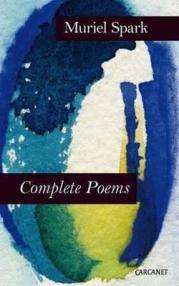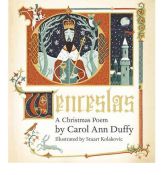 The Complete Poems by Muriel Spark ***
The Complete Poems by Muriel Spark ***
I have read a lot of Spark’s fiction, but none of her poetry; it seemed obvious, therefore, to pick up a copy of her Complete Poems and read it during the month of her centenary. The poems here are not chronologically ordered, which annoyed me a little; I like to see how poets evolve over time, particularly over the decades in which Spark wrote. The content here is quite varied; Spark writes extensively about writing and London, which I was expecting, but other poems deal with catching bad colds, and leaning over old walls, which I perhaps was not.
Spark’s poems are witty and clever, but the collection did not feel like a coherent one to me. Perhaps this is because of the lack of chronological ordering; had it been structured in this way, and one could see the progression of Spark’s poetic voice and the continuation of themes, it would have worked better. Sadly, some of the poems here were a little silly and juvenile for my particular taste, and I was largely indifferent to the collection as a whole; very few of these poems really stood out.
The Sun and Her Flowers by Rupi Kaur ** 
I downloaded a copy of Rupi Kaur’s The Sun and Her Flowers from my library’s online catalogue, mainly to see what all the hype was about. I am one of the few, it seems, that hasn’t read her debut poetry collection, Milk and Honey, and doubt that I will seek out a copy after my experience with this, her second book.
Firstly, I wasn’t at all a fan of the illustrations, and do not feel as though they have a place within poetry anyway; they detract somewhat from the actual writing, and make it feel a bit gimmicky. The Sun and Her Flowers largely felt fragmented to me, like a series of quite random thoughts had been quickly jotted down. It felt unfinished. I found the collection quite banal at times, because the same themes are repeated over and over again; the two overriding themes are ‘woe is me’, and ‘I am strong and powerful’. Whilst I enjoyed a few of these poems, I felt indifferent to the vast majority of them. It is not the kind of poetry which grabs you and doesn’t let go; yes, it passes a couple of hours, but I do not feel as though I really got anything of worth from the collection. I perhaps would have enjoyed it more before I had discovered the likes of Sylvia Plath, or had I read it whilst in my early teens. It had an overarching ‘Tumblr’ feel to it.
Also, as far as I’m concerned, the following is not a poem (yet it is in Kaur’s book): ‘you do not just wake up and become the butterfly’.

 This was the first of Duffy’s Christmas poems which I read after finding a lovely little copy for fifty pence in a Notting Hill bookshop, and it evokes one of my favourite historic Christmas stories, that of the 1914 truce between German and English soldiers in the trenches, when they played the famous football match and sang carols. There is such humanity and sensitivity packed into these pages, and it is a true delight to settle down with each winter.
This was the first of Duffy’s Christmas poems which I read after finding a lovely little copy for fifty pence in a Notting Hill bookshop, and it evokes one of my favourite historic Christmas stories, that of the 1914 truce between German and English soldiers in the trenches, when they played the famous football match and sang carols. There is such humanity and sensitivity packed into these pages, and it is a true delight to settle down with each winter.
 Alice Stevenson’s art is lovely and fitting, particularly with regard to scenery and still lives, and Duffy is on form with the originality of her wordplay throughout. I particularly enjoyed the use of sibilants, and think that this would be a great volume to read aloud: ‘The moon rose; the shepherd’s sprawled, / shawled, / a rough ring on sparse grass, passing / a leather flask’, for instance. On the whole, it is a really sweet poem which promotes a nice message, but I think it would have been better had it been extended slightly. Still, it is a lovely contemplative Christmas read.
Alice Stevenson’s art is lovely and fitting, particularly with regard to scenery and still lives, and Duffy is on form with the originality of her wordplay throughout. I particularly enjoyed the use of sibilants, and think that this would be a great volume to read aloud: ‘The moon rose; the shepherd’s sprawled, / shawled, / a rough ring on sparse grass, passing / a leather flask’, for instance. On the whole, it is a really sweet poem which promotes a nice message, but I think it would have been better had it been extended slightly. Still, it is a lovely contemplative Christmas read. I put off reading Dorothy Wordsworth’s Christmas Birthday when it was first released as Carol Ann Duffy’s annual Christmas poem, but couldn’t resist ordering a secondhand copy to read over Christmas 2016. It’s not that festive, but it is a lovely little volume. The art style is gorgeous, and I loved the use of just a few colours, an effective and evocative choice on the part of the illustrator. The poem itself was sweet; not my favourite Duffy, but a simple and vivid story nonetheless. It is not as playful as a lot of her other work; the vocabulary used is not unusual, and was even a little simplistic in places. Still, I feel that I will probably indefinitely reread this once a year as the festive season rolls around.
I put off reading Dorothy Wordsworth’s Christmas Birthday when it was first released as Carol Ann Duffy’s annual Christmas poem, but couldn’t resist ordering a secondhand copy to read over Christmas 2016. It’s not that festive, but it is a lovely little volume. The art style is gorgeous, and I loved the use of just a few colours, an effective and evocative choice on the part of the illustrator. The poem itself was sweet; not my favourite Duffy, but a simple and vivid story nonetheless. It is not as playful as a lot of her other work; the vocabulary used is not unusual, and was even a little simplistic in places. Still, I feel that I will probably indefinitely reread this once a year as the festive season rolls around. I love the fact that The King of Christmas is based upon tradition from the Middle Ages, in which a Lord of Misrule could be appointed to take charge if the original ruler was in need of a break, or some light relief. The art here is very appealing, and Duffy’s rhyme scheme and wordplay worked perfectly. Thoughtful and mischievous, The King of Christmas evokes winters past in rather a magical way. It is a perfect addition to the set.
I love the fact that The King of Christmas is based upon tradition from the Middle Ages, in which a Lord of Misrule could be appointed to take charge if the original ruler was in need of a break, or some light relief. The art here is very appealing, and Duffy’s rhyme scheme and wordplay worked perfectly. Thoughtful and mischievous, The King of Christmas evokes winters past in rather a magical way. It is a perfect addition to the set. My favourite poems from the First World War in this collection are: ‘The Soldier’ by Rupert Brooke, ‘Into Battle’ by Julian Grenfell, ‘In Flanders Fields’ by John McCrae, ‘All the hills and vales…’ by Charles Sorley, ‘Range-Finding’ by Robert Frost, ‘Calligram, 15 May 1915’ by Guillaume Apollinaire, ‘Reprisals’ by W.B. Yeats, ‘The Hero’ by Siegfried Sassoon, ‘Glory of Women’ by Siegfried Sassoon, ‘In Memoriam’ by Edward Thomas, ‘The Cherry Trees’ by Edward Thomas, ‘Rain’ by Edward Thomas, ‘As the team’s head brass’ by Edward Thomas, ‘To His Love’ by Ivor Gurney, ‘The Silent One’ by Ivor Gurney, ‘On Receiving News of the War’ by Isaac Rosenberg, ‘Break of Day in the Trenches’ by Isaac Rosenberg, ‘Dead Man’s Dump’ by Isaac Rosenberg, ‘Returning, We Hear the Larks’ by Isaac Rosenberg, ‘Anthem for Doomed Youth’by Wilfred Owen, ‘Dulce et Decorum Est’ by Wilfred Owen, ‘Exposure’ by Wilfred Owen, ‘Insensibility’ by Wilfred Owen, ‘The Send-Off’ by Wilfred Owen, ‘Futility’ by Wilfred Owen, ‘Strange Meeting’ by Wilfred Owen, ‘Two Voices’ by Edmund Blunden, ‘Winter Warfare’ by Edgell Rickword, ‘My sweet old etcetera…’ by e.e. cummings, ‘next to of course god…’ by e.e. cummings, ‘i sing of Olaf’ by e.e. cummings, ‘In the Dordogne’ by John Peale Bishop, ‘For the Fallen’ by Laurence Binyon and ‘Rouen’ by May Wedderburn Cannan.
My favourite poems from the First World War in this collection are: ‘The Soldier’ by Rupert Brooke, ‘Into Battle’ by Julian Grenfell, ‘In Flanders Fields’ by John McCrae, ‘All the hills and vales…’ by Charles Sorley, ‘Range-Finding’ by Robert Frost, ‘Calligram, 15 May 1915’ by Guillaume Apollinaire, ‘Reprisals’ by W.B. Yeats, ‘The Hero’ by Siegfried Sassoon, ‘Glory of Women’ by Siegfried Sassoon, ‘In Memoriam’ by Edward Thomas, ‘The Cherry Trees’ by Edward Thomas, ‘Rain’ by Edward Thomas, ‘As the team’s head brass’ by Edward Thomas, ‘To His Love’ by Ivor Gurney, ‘The Silent One’ by Ivor Gurney, ‘On Receiving News of the War’ by Isaac Rosenberg, ‘Break of Day in the Trenches’ by Isaac Rosenberg, ‘Dead Man’s Dump’ by Isaac Rosenberg, ‘Returning, We Hear the Larks’ by Isaac Rosenberg, ‘Anthem for Doomed Youth’by Wilfred Owen, ‘Dulce et Decorum Est’ by Wilfred Owen, ‘Exposure’ by Wilfred Owen, ‘Insensibility’ by Wilfred Owen, ‘The Send-Off’ by Wilfred Owen, ‘Futility’ by Wilfred Owen, ‘Strange Meeting’ by Wilfred Owen, ‘Two Voices’ by Edmund Blunden, ‘Winter Warfare’ by Edgell Rickword, ‘My sweet old etcetera…’ by e.e. cummings, ‘next to of course god…’ by e.e. cummings, ‘i sing of Olaf’ by e.e. cummings, ‘In the Dordogne’ by John Peale Bishop, ‘For the Fallen’ by Laurence Binyon and ‘Rouen’ by May Wedderburn Cannan.
 Words cannot describe how much I absolutely adore the poetry of Alfred Lord Tennyson. Ever since first coming across him in my teens, I have been struck by the beautiful images which he sculpts, the history and mythology which he weaves in, and the sheer power of the language choices which he makes. Reading his Collected Poems for my Classics Club challenge this summer was the third time in which I have settled down to do so. Whilst I sadly did not make it through the entire volume this time around due to time constraints, I loved the process, and re-reading his poems felt as though I was in the company of the oldest and most comfortable of friends.
Words cannot describe how much I absolutely adore the poetry of Alfred Lord Tennyson. Ever since first coming across him in my teens, I have been struck by the beautiful images which he sculpts, the history and mythology which he weaves in, and the sheer power of the language choices which he makes. Reading his Collected Poems for my Classics Club challenge this summer was the third time in which I have settled down to do so. Whilst I sadly did not make it through the entire volume this time around due to time constraints, I loved the process, and re-reading his poems felt as though I was in the company of the oldest and most comfortable of friends.